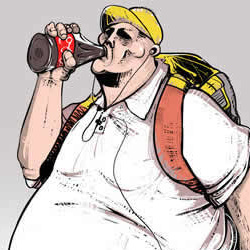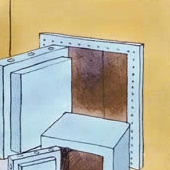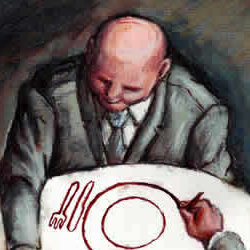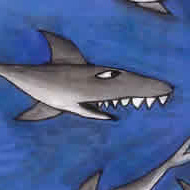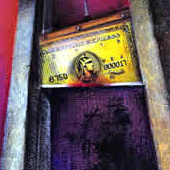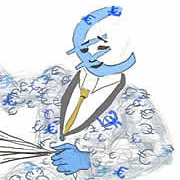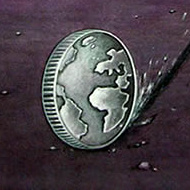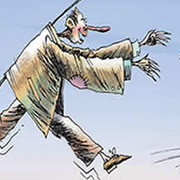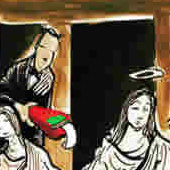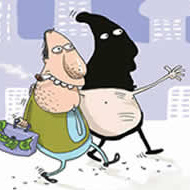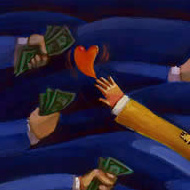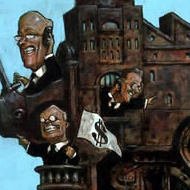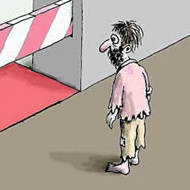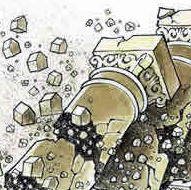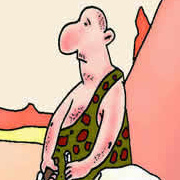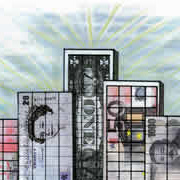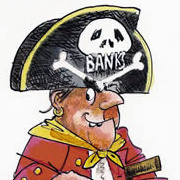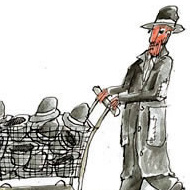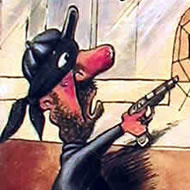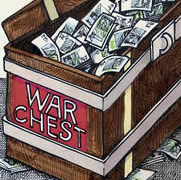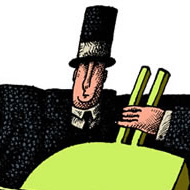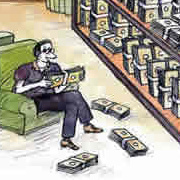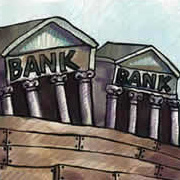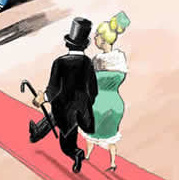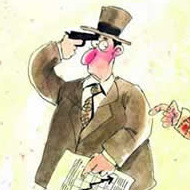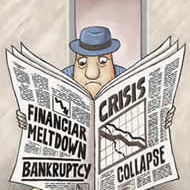Competition — 2010
Money makes the world go round
Globalisation, financial meltdown, fair-trade and economic justice
Cartoonists on the money
Money Makes the World Go Around, or at least that's what we all believed before the financial crash last year. It is also the very apposite title of this year's biennial International Political Cartoon Competition organised by the Ken Sprague Fund.
In times of economic downturn and tight expenditure, most of us are desperate for something to put a smile on our faces again, and cartoons can do that better than most things. However, many of the cartoons submitted this year are not so much a big laugh as a pause for reflection, they offer an incisive satirical condemnation, in visual form, of the power of money to impoverish and destroy as well as to make a select few very wealthy. They really do force you to see money in a different light.
Working people in the highly developed countries may feel the pinch, but for those living in large areas of Africa, Asia and Latin America this financial crisis, brought about by the greed of western banks, can mean much more than going without a few things it can bring total destruction of a way of life, destitution and hunger.
The Dollar and Euro as the bogey-men behind the global mayhem turn up unsurprisingly as recurrent images. Old masters are reworked in new guises. Leonardo's last supper, for instance, where even Jesus's credit card is not accepted; Breughel's Peasant Wedding becomes a corporate bean-feast, with the peasants being fed Big Mac hamburgers under the yellow arches and the kids play on the straw-covered floor with Coca-Cola hats; Edvard Munch's Scream appears in several guises to convey the terror and angst of the crash. Even Michelangeloís Sistine Chapel portrayal of God creating man is subverted by Iliya Asenov, with God handing Adam a wad of money from his ëlong-term loaní case.
Over 240 cartoonists submitted over 500 works, representing 50 different countries.
On the jury this year were Martin Rowson, cartoonist for the Guardian/Morning Star, and leading women cartoonists, Jacky Fleming and Viv Quillin, Morning Star arts correspondent Clifford Cocker, ceramicist Sandy Brown and Pat Milner from the Appledore Visual Arts Festival organising committee and New Internationalist co-editor, Alan Hughes.
After much deliberation they chose four winners and a best young cartoonist (age up to 25yrs). First prize went to Farhad Bahrami Reykani from Iran, second prize went to Ross Thomson from the UK and joint third prizes were awarded to: Mihai Ignat from Romania and Robert Gumpertz from the USA.
The reasons the jury gave for eventually choosing the winners was as follows: Farhad Bahrami Reykani from Iran, although only age 25 yrs is our youngest winner so far. He demonstrated impressive drawing skill. His characterisation of the ërich westí as an over-fed, fat and vulgar white tourist, with his earphones stuck in his ears, swigging Coca-Cola, and the poor in the developing world, symbolised by a black child, left only a dribble of polluted water is a powerful statement that encapsulates the crass economic injustice in today's world.
Ross Thomson, cleverly utilises the idea of the famous Russian dolls that fit into each other as they become smaller and puts them in a banking context. The two robbers are opening the bankís safes, but find only smaller and smaller safes inside the larger ones, ending up with nothing for their labours, like many in the world today who have lost savings and jobs because of the banking crisis.
The third prize was awarded jointly to two cartoonists as the jury was unable to choose one above the other.
Mihai Ignat (Romania) produced a wonderfully executed and very painterly cartoon which showed in clear visual terms what money signifies for many of us today: without money you canít eat. So as the customer attempts to pay with money drawn on the table cloth, the waiter, in response, draws his plate for the food on to the table cloth too.
Robert Gumpertz (USA) immediately made members of the jury chuckle. It is a simple drawing with a strong message: Its humour lies in its oxymoronic assertion that the most dangerous and vicious fish in the sea could be frightened of a skinny little man in a diverís suit. It underlines the point that it is the bankers who have brought the world to the brink of economic collapse and in their behaviour are in fact more dangerous than sharks and, in fact, are the sharks in our society.
Exhibitions of the best cartoons will be held in venues around the country, beginning with the Appledore Visual Arts Festival in June.
Entries
